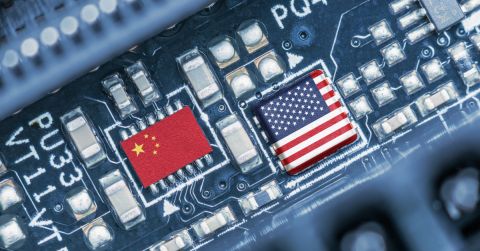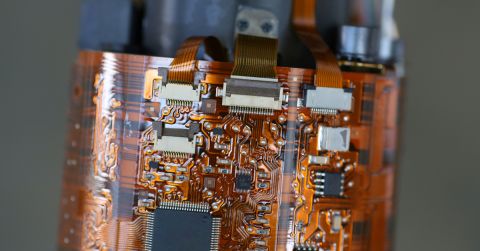Proposed Export Controls Target Persian Gulf States

In 2022, the Biden administration imposed a set of export controls to restrict China's access to advanced chips; it is now proposing the expansion of those export controls.
Advanced AI chips—and the intelligence it takes to make them—are essential American assets critical to our national defense. These chips underpin breakthroughs in autonomous systems, machine learning, and military AI, making them pivotal in modern warfare and national security. Protecting these critical American assets allows America to maintain its technological dominance and national security, something the Biden administration aims to do through U.S. export controls, expanding export restrictions on advanced AI chips to prevent China and other countries, particularly in the Persian Gulf, from accessing critical AI capabilities.
The move reflects U.S. concerns about the global spread of AI technology and its military applications, such as lethal autonomous weapons systems (LAWS), autonomous drones, and Military AI. Key to these restrictions are advanced AI chips, like those made by Nvidia, which are essential for modern warfare.
Targeting the Persian Gulf
The Persian Gulf nations, including the United Arab Emirates (UAE) and Saudi Arabia, have become essential players in global trade and technology. Their increasing economic ties to China have raised concerns, as these nations may act as intermediaries, rerouting sensitive AI technologies to Beijing and inadvertently undermining U.S. export controls.
By broadening the list of restricted countries, the Biden administration seeks to stop "technology leakage" and ensure that its controls are effective in preventing adversarial nations from obtaining sensitive technologies through third-party states.

The Ripple Effect: Political Alliances and National Security
As well-intentioned as the proposed restrictions may be, the ripple effect is that they introduce complexities into relations with crucial Gulf allies.
The UAE's emergence as an AI hub and Saudi Arabia's Vision 2030 initiative highlight their heavy investments in global tech partnerships, including collaborations with American firms. Blocking access to American chips may jeopardize these relationships and ultimately strengthen the nation's ties with China. This adds another layer of complexity to political dynamics as the U.S. is reliant on the Gulf for Middle Eastern stability.
Additionally, both Gulf nations are leveraging AI for transformative initiatives that position them as key players in global tech innovation. For instance, the UAE's National Artificial Intelligence Strategy 2031 aims to integrate AI across government services, healthcare, and public safety. As part of its Smart Dubai projects, the country partnered with IBM to establish IBM AI Lab, which will harness "the power of machine learning to integrate AI into government services and city experiences in order to improve our citizens' overall quality of life, boost happiness levels and maximize visitor satisfaction."
Similarly, Saudi Arabia's Vision 2030 relies on AI to drive economic diversification, with projects like NEOM incorporating cutting-edge AI technologies in transportation, energy, and city planning. These nations are also exploring AI's potential in defense, focusing on autonomous systems and cybersecurity. Stricter U.S. controls on advanced AI technologies could hinder these ambitious efforts, creating opportunities for European and Asian competitors to deepen their ties with the region and fill the resulting technological void.
Strategic Shifts: Economic Realities for the U.S. Tech Industry
For American chip companies like Nvidia, Intel, and AMD, the expanded export controls may result in restricted market access, shrinking revenues from once lucrative regions. These economic pressures could incentivize global competitors to capitalize on untapped markets.
Nvidia has been a critical supplier of AI chips to global markets, including China. After initial export controls in 2022, Nvidia produced "China-only" chip versions to comply with U.S. regulations while retaining access to the Chinese market.
While intended to protect national security, these controls could restrict growth in an increasingly globalized tech economy. As demand for AI chips grows, companies may need to explore new markets outside U.S. policy restrictions.
New Trade Dynamics: Shifting Tides in Global Supply Chains
As the two largest economies compete for leadership in emerging technologies, particularly AI, China aims to be a leader by 2030 and has made substantial progress in its semiconductor industry. As we've shared, The U.S. seeks to hinder China's advancements and maintain its edge by limiting access to crucial AI technologies.
However, as we know, necessity is the mother of invention—a need or problem can incite creative efforts to find a solution, and this strategy might push China to expedite the development of its domestic alternatives. With significant investments in its semiconductor sector to lessen reliance on foreign suppliers, China could eventually undermine U.S. export restrictions and become more self-reliant over time.
Expanded restrictions could also trigger retaliation from affected nations, such as China, which has vehemently opposed U.S. export controls and has accused Washington of unfair trade practices. If the Biden administration extends these restrictions to the Persian Gulf, it could alienate key allies and push them closer to China, leading to a more fragmented global technology landscape.
Export controls targeting the Gulf could ultimately open the door for European and Asian suppliers, who may be better positioned to navigate these markets without similar restrictions.
Impact on the PCB Industry
If implemented, PCB manufacturers exporting components to Gulf nations may face increased supply chain disruptions and compliance challenges. Stricter licensing requirements and enhanced regulations can lead to delayed shipments and increased administrative costs, eroding profits and putting additional pressure on already stretched human resources and brittle supply chains.
Smaller manufacturers, in particular, may struggle to absorb the extra compliance costs associated with meeting complex export requirements, further compressing margins in a competitive market.
And, of course, high-performance PCBs rely on components like semiconductors and advanced substrates, many of which are subject to overlapping export regulations. This complexity could disrupt production timelines and force manufacturers to rethink sourcing strategies.
While for U.S.-based PCB manufacturers, the proposed policies could pose compliance challenges and erode market share, with strategic diversification and innovation, manufacturers could turn the challenge into an opportunity and expand to new markets and sectors.
Opportunities for Competitors
Although inadvertently, by closing the door to markets, export controls may be opening the door to competition, creating opportunity for non-American competitors, unburdened by American export laws, to strengthen their foothold in restricted markets.
European and Asian companies have historically demonstrated agility in adapting to complex regulatory environments. For example, Asian semiconductor and PCB firms have increasingly stepped in to address gaps created by U.S. restrictions in China, bolstering their market stance.
The Persian Gulf could witness a similar trend, with European and Asian firms leveraging the opportunity for growth and stepping in to supply critical components, leaving U.S. manufacturers at risk of losing long-term market share and potentially diminishing their global standing.
A Final Note
Seen as a protectionist measure, it's clear that the Biden administration's heightening of export controls carries risks, potentially alienating allies and stifling global innovation.
As readers likely know, any disruption at any node in the supply chain could lead to bottlenecks in production. This is particularly threatening in sectors like automotive manufacturing, where AI chips are essential for developing autonomous vehicles.
There's no denying that American trade policies, such as the proposed export controls, will shape the future of AI, global trade, and international relations. With significant stakes for national security, economic growth, and global political partnerships, the outcome of these policies will have far-reaching consequences for the technological landscape and the geopolitical order—exactly what those consequences are, we anxiously await to see.










